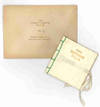
Medical Geography in Historical Perspective.
by RUPKE, Nicolaas A
- Used
- Hardcover
- Condition
- See description
- ISBN 10
- 0854840729
- ISBN 13
- 9780854840724
- Seller
-
Montreux, Switzerland
Payment Methods Accepted
About This Item
London:: Wellcome Trust Centre, 2000., 2000. Series: Medical History, Supplement no. 20. 8vo. xii, 227, [1] pp. Color plate, figs., index. Navy gilt-stamped cloth. Near fine. ISBN: 0854840729 'Research in the geography of health, disease, and disability has always occupied an ambiguous position within the discipline of geography. Historians of science and medicine have traced the genealogy of medical geography back to the Enlightenment, and medical geographic approaches today inform a wide variety of research endeavors in the social and behavioral sciences. Yet until the 1990s, historians of the discipline of geography neglected this subfield. In their more reflective moments, modern medical geographers imagine themselves to be carrying the torch for an ancient tradition stretching back to Hippocrates; their programmatic statements and reviews, however, maintain that modern medical geographic research originated in the Second World War. It is wonderful, then, to see that they can now turn to works such as Medical Geography in Historical Perspective for a sense of the overall movement and evolution within their field. / The essays in this volume were compiled by Nicolaas Rupke after a symposium with the same title held at the George-August-Universitat Gottingen in June 1996. The Rupke collection focuses on the contributions of particular geographers, physicians, or national schools during the nineteenth century, a period when medical geography was considered (at least according to Ronald Numbers, p. 217) to be the 'queen' of the medical sciences. This was also a time of intense colonial expansion, and many of the contributions focus on the role of medical [End Page 617] geography as an applied imperial science. For this period before the establishment of the discipline of geography, deciding which discourses of colonialism were distinctly 'medical geographic' can sometimes be difficult, and the contributors to this collection employ definitions of medical geography that are often in conflict. This weakness is countered nicely in an introductory essay by Conevery Bolton Valeneius that considers the familial relations between kindred traditions of research in geography and health. / For heuristic purposes, I distinguish three distinct orientations to research practice in contemporary medical geography. These orientations are associated with a disease geography tradition with roots in ecological analysis; a geography of health tradition, drawing more on cultural methodologies; and a health care or health services geography tradition concerned with planning and policy interventions.1 By my own accounting, contributors to the Rupke volume treat the first two of these traditions well, but neglect the third. / Most of the contributors are concerned with disease geography and disease-mapping approaches. Understandably, given the location of the conference that resulted in the edited collection, German disease geography of the nineteenth century is most completely represented, with a special emphasis by Nicolaas Rupke and his fellow researchers on the influential statistical and representational methods of Alexander von Humboldt. Yet authors explore other national contexts as well, including the French, Dutch, Australian, and American colonial spheres. Michael Osborne (analyzing French medical geography and cartography) and Mark Harrison (analyzing medical topography in British India) offer useful theoretical insights on health geography's role in the colonies. Together, they challenge the historiographic commonplace (associated with Edward Said) whereby local medical topographies are assumed to contribute seamlessly to a unified 'Orientialist' worldview.2 Osborne and Harrison find that techniques of landscape analysis significantly inform discourses of colonial resistance as well . . .' - Bulletin of the History of Medicine, Johns Hopkins University Press, Volume 76, Number 3, Fall 2002.
Reviews
(Log in or Create an Account first!)
Details
- Bookseller
- Jeff Weber Rare Books
(CH)
- Bookseller's Inventory #
- M13566
- Title
- Medical Geography in Historical Perspective.
- Author
- RUPKE, Nicolaas A
- Book Condition
- Used
- Binding
- Hardcover
- ISBN 10
- 0854840729
- ISBN 13
- 9780854840724
- Publisher
- Wellcome Trust Centre, 2000.
- Place of Publication
- London:
- Date Published
- 2000
- Keywords
- Medical Geography
Terms of Sale
Jeff Weber Rare Books
30 day return guarantee, with full refund including shipping costs for up to 30 days after delivery if an item arrives misdescribed or damaged.
About the Seller
Jeff Weber Rare Books
Biblio member since 2006
Montreux
About Jeff Weber Rare Books
Visitors are welcome to the shop. Call ahead for an appointment if you wish to meet with me. On display are about 12,000 books.
Glossary
Some terminology that may be used in this description includes:
- Fine
- A book in fine condition exhibits no flaws. A fine condition book closely approaches As New condition, but may lack the...
- Cloth
- "Cloth-bound" generally refers to a hardcover book with cloth covering the outside of the book covers. The cloth is stretched...
- Plate
- Full page illustration or photograph. Plates are printed separately from the text of the book, and bound in at production. I.e.,...




